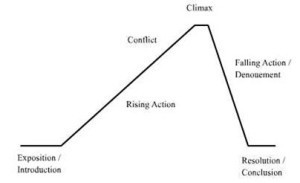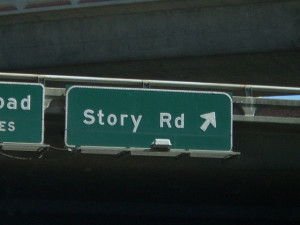Plot: My Writer Weakness
The fact that I actually had to stand still and think about what “plot” means and then go grab one of my writing books to confirm my theory pretty much says it all. Plot is my number one weakness as a writer. No question.
I remember every year in English class we’d come to the point in the semester when we’d be asked as a group to define plot. It may have been the only time during the year that I would avoid eye contact with my teacher because I wasn’t 100% sure of my answer. Then of course this baby would be broken out:

I’d shake my head at myself and scowl because I felt I should have known intrinsically.
Then university came along. When studying English lit the plot of a novel is not even worth talking about. Hell, I didn’t even read a whole heck of a lot of novels –as they would be considered today. Thus, the diagram was only ever brought up in the first or second lecture in whichever creative writing class I was taking. Once. It was never deemed all important or truly relevant.
My creative writing classes were never labelled as such, but literary fiction really was expected. Plotless literary fiction. You could push the envelope with magical realism –hell, since Alberta is the Canadian centre of magical realism the genre was embraced– but anything else wasn’t really encouraged. Not discouraged, but not encouraged. I stuck to standard literary fiction and added historical fiction when I wanted to climb outside the box.
On top of that, I’ve worked far more with short stories than I have with novels. Short stories allow for a weaker plot than full novels because they’re a different art-form. Ambiguity is encouraged, only a couple of characters are permissible, the ending can be left hanging, and subplots can’t really exist within the constraints.
Are you starting to see my problem?
Without a great intrinsic grasp of plot, a lack of reinforcement, and a lack of practice, my plot skills are rudimentary at best. I know a story needs a beginning, a middle, an end. I know how to get from point A to B to C. I know that there needs to be a buildup to the final end, especially if there are lots of little ends throughout. Gluing all the pieces together, though, is where I falter.
When I’m forcing it I tend to sound like an instruction manual and move my characters around like robots because they need to be doing [THIS] [HERE] for my story to make sense overall. They become lifeless. Which makes my story lifeless.

I’ve had discussions with people about plays/musicals/movies adapted from books where they say the other medium handled the plot better than the author of the book. Honestly, I couldn’t care less about the plot if I liked the story. I read for characters, relationships, and culture. What happens to them matters but if I care about them that can be pushed to the wayside for me.
However, I completely understand that the world is not full of readers who agree with me. Plot matters to a lot of people. A LOT.
So I have to learn how to do it properly. And it can be frustrating. Writing instruction books help, so do other writers, and I can’t forget editors. Practice is probably the most important and significant aid. Knowing your weaknesses and your areas of struggle are the first step to overcoming them. And when you get to editing time you’ll know where to pay extra attention.
What about you? Do you have an area of writing that you struggle with? What have you done to overcome it?

The post Plot: My Writer Weakness appeared first on Anxiety Ink.
Anxiety Ink
- Kate Larking's profile
- 53 followers



